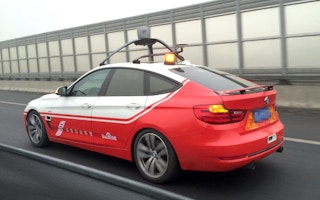Chinese officials urged on Thursday to improve regulations over and establish cross-ministry cooperation on automated and connected vehicles, specifically autonomous driving technologies.
The country is conducting preliminary studies on an intelligent transportation control network, with a pilot program to be carried out in the near future, said the Ministry of Transport’s chief engineer Zhou Wei in a speech at the 2016 Beijing Autonomous Driving Panel Debate.
“The government is positive though cautious on the development of the technologies. The country is establishing a specialized testing environment,” said Wang Xiaojing, chief engineer of the ministry’s Research Institute of Highway.
Experts said a regulation banning drivers from taking both hands off the steering wheel currently renders autonomous driving tests illegitimate despite the lack of clear regulations on the technology.
“It’s a step-by-step development … but a legal framework is needed to start testing autonomous driving,” said Peter Mertens, senior vice-president of research and development at Volvo Car Group.
Unfavorable regulations is one of many major obstacles hindering the development and application of autonomous driving technologies, according to a Boston Consulting Group report released in October.
Last year, only one autonomous driving test, by BMW and Baidu in December, was conducted in China. The majority of tests were conducted in the United States.
But there is great interest in the technology in China. According to the World Economic Forum, Chinese people are open to the idea of autonomous cars. In its report released in November, 76 percent of Chinese surveyed said they were open to riding in an autonomously driven car, significantly higher than the global average of 58 percent.
Changan Automobile Co and BAIC Motor said they are planning to unveil self-driving models, while Volvo Cars is slated to launch its Drive Me project, which invites Chinese drivers to use the company’s autonomous driving cars in real traffic, next year. The premium carmaker has been testing 100 fully autonomous cars in Sweden since 2013 and a trial of the program will be open to the public in 2017.
Xin Guobin, vice-minister of the Ministry of Industry and Information Technology, said the ministry is working on a standardization system for autonomous-driving cars.
He said safety must be a priority and that cooperation is essential to furthering the technology.
“Human are very good at making the right decisions-they just take a longer time. Computers can make decisions within a short time, but it’s more difficult for them to recognize a situation,” Mertens said. “Improvements are still needed for computers to make the right decision.”
Li Shufu, chairman of Volvo Cars, said it would be impossible to develop fully autonomous cars in “one go”.
“It is the foundation to have the technology competent and products mature, and that relies on the exploration of all professions.”
China is expected to have the highest number of autonomous vehicles in the world by 2035, with about 8.6 million units including 5.2 million that are partially autonomous and 3.4 million fully autonomous.
California is currently drafting a regulation on autonomous driving on public roads.

















